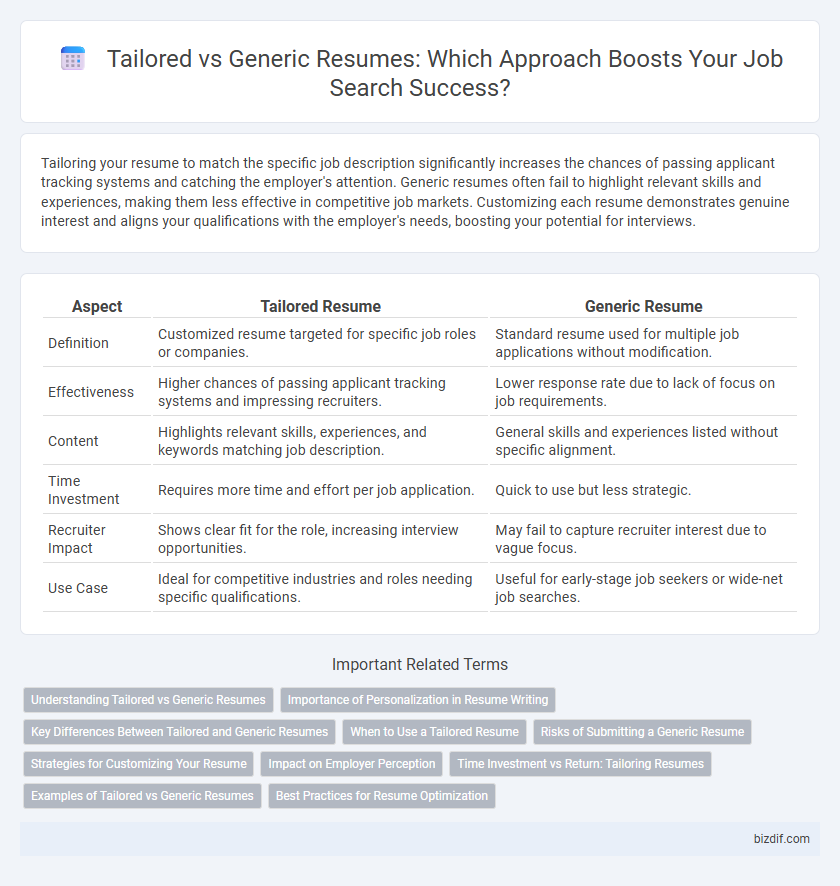Tailoring your resume to match the specific job description significantly increases the chances of passing applicant tracking systems and catching the employer's attention. Generic resumes often fail to highlight relevant skills and experiences, making them less effective in competitive job markets. Customizing each resume demonstrates genuine interest and aligns your qualifications with the employer's needs, boosting your potential for interviews.
Table of Comparison
| Aspect | Tailored Resume | Generic Resume |
|---|---|---|
| Definition | Customized resume targeted for specific job roles or companies. | Standard resume used for multiple job applications without modification. |
| Effectiveness | Higher chances of passing applicant tracking systems and impressing recruiters. | Lower response rate due to lack of focus on job requirements. |
| Content | Highlights relevant skills, experiences, and keywords matching job description. | General skills and experiences listed without specific alignment. |
| Time Investment | Requires more time and effort per job application. | Quick to use but less strategic. |
| Recruiter Impact | Shows clear fit for the role, increasing interview opportunities. | May fail to capture recruiter interest due to vague focus. |
| Use Case | Ideal for competitive industries and roles needing specific qualifications. | Useful for early-stage job seekers or wide-net job searches. |
Understanding Tailored vs Generic Resumes
Tailored resumes are customized to match the specific job requirements, incorporating relevant keywords and skills from the job description to increase applicant tracking system (ATS) compatibility. Generic resumes, by contrast, use a broad format that lacks personalized details and often fail to highlight competencies critical to the targeted role. Understanding the distinction between tailored and generic resumes is essential for maximizing interview opportunities and effectively showcasing qualifications aligned with employer expectations.
Importance of Personalization in Resume Writing
Personalization in resume writing significantly increases the chances of catching a recruiter's attention by aligning skills and experiences with specific job requirements. Tailored resumes highlight relevant achievements and keywords, optimizing the document for applicant tracking systems (ATS) and ensuring a higher ranking. Generic resumes often fail to demonstrate a strong fit, reducing interview opportunities and weakening overall impact.
Key Differences Between Tailored and Generic Resumes
Tailored resumes are customized for specific job descriptions, highlighting relevant skills, experiences, and achievements that match the employer's requirements, increasing the chances of passing Applicant Tracking Systems (ATS). Generic resumes provide a broad overview of qualifications without focusing on specific roles, often resulting in less engagement from recruiters and lower interview callbacks. Emphasizing keyword optimization and role-specific accomplishments distinguishes tailored resumes from generic ones, making them more effective in competitive job markets.
When to Use a Tailored Resume
Use a tailored resume when applying for specific job openings that require aligning your skills and experiences directly with the job description. Employers favor tailored resumes because they clearly demonstrate how your qualifications meet their unique needs, increasing your chances of passing Applicant Tracking Systems (ATS). Tailoring is especially critical for competitive roles or industries with precise skill requirements, ensuring your application stands out.
Risks of Submitting a Generic Resume
Submitting a generic resume significantly reduces the chances of passing applicant tracking systems (ATS) that prioritize keyword relevance specific to the job description. Recruiters often dismiss generic resumes for lacking clear alignment with required skills, leading to missed interview opportunities. Tailoring resumes to match job criteria enhances visibility and demonstrates genuine interest, minimizing the risk of being overlooked in competitive hiring processes.
Strategies for Customizing Your Resume
Customizing your resume involves strategically aligning your skills, experiences, and keywords with the specific job description to increase relevance and attract recruiters' attention. Prioritize highlighting accomplishments and qualifications that directly match the job requirements, using quantifiable metrics to demonstrate impact. Employ ATS-friendly formatting and incorporate industry-specific terminology to ensure your resume passes automated screening and resonates with hiring managers.
Impact on Employer Perception
Tailoring resumes to specific job descriptions significantly enhances employer perception by demonstrating a clear alignment with the company's needs and industry language. Generic resumes often lead to lower engagement as they fail to highlight relevant skills and experiences, reducing the candidate's perceived value. Customization increases the chances of passing applicant tracking systems (ATS) and impressing hiring managers with targeted achievements and qualifications.
Time Investment vs Return: Tailoring Resumes
Tailoring resumes requires a higher time investment, involving customization of keywords, skills, and job descriptions to match specific job postings, which significantly increases the likelihood of passing applicant tracking systems and catching recruiters' attention. Generic resumes save preparation time but often result in lower response rates due to lack of relevance and specificity for each job role. Prioritizing tailored resumes maximizes return by improving interview callbacks and demonstrating a precise fit for the targeted position.
Examples of Tailored vs Generic Resumes
Tailored resumes highlight specific skills and achievements relevant to the job description, such as quantifying sales growth by 30% for a marketing position, while generic resumes list broad responsibilities like "managed projects" without details. For example, a tailored resume for a software developer includes programming languages like Python and projects involving AI algorithms, compared to a generic resume stating "experience in software development." Employers prioritize tailored resumes as they demonstrate direct alignment with job requirements, increasing interview callbacks by up to 50%.
Best Practices for Resume Optimization
Tailoring resumes to match specific job descriptions increases the likelihood of passing Applicant Tracking Systems (ATS) by incorporating relevant keywords and industry-specific terminology. Generic resumes often lack the targeted focus required to highlight key skills and achievements that align with employer needs, reducing overall engagement. Best practices for resume optimization emphasize customizing content for each application while maintaining clarity, impactful language, and measurable results.
Tailoring vs Generic Infographic

 bizdif.com
bizdif.com